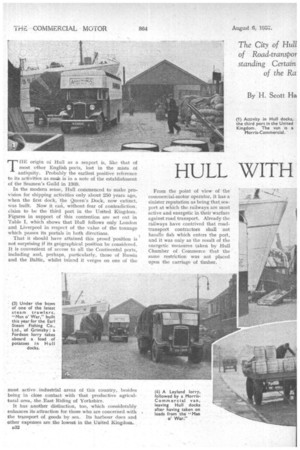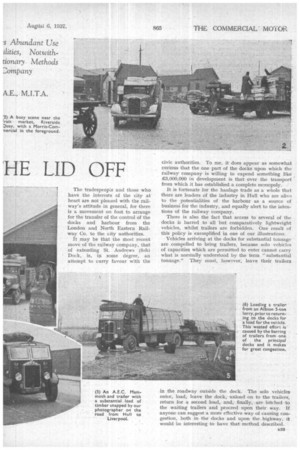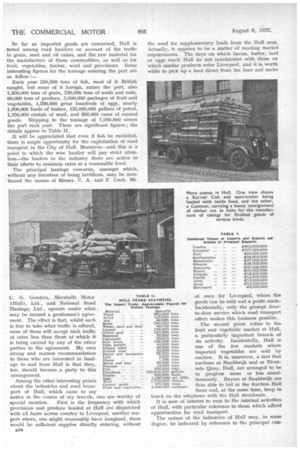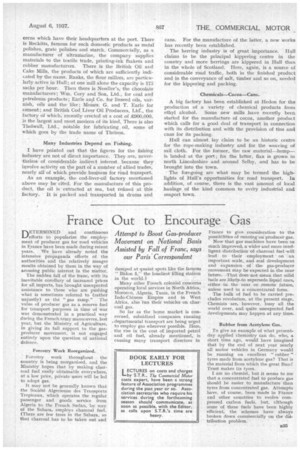HULL WITH HE LID OFF
Page 38

Page 39

Page 40

Page 41

If you've noticed an error in this article please click here to report it so we can fix it.
By H. Scott Ha A.E., M.I.T.A.
THE origin oi Hull as a seaport is, like that of most other English ports, lost in the mists of
• antiquity. Probably the earliest positive reference to its activities as suclib is in a note of the establishment of the Seamen's Guild in 1369.
In the modern sense, Hull commenced to make provision for shipping activities only about 250 years ago, when the first dock, the Queen's Dock, now extinct, was built. Now it can, without fear of contradiction, claim to be the third port in the United Kingdom. Figures in support of this contention are set out in Table I, which shows that Hull follows only London and Liverpool in respect of the value of the tonnage which passes its portals in both directions.
That it should have attained this proud position is not surprising if its geographical position be considered. It is convenient of access to all the Continental ports, including and, perhaps, particularly, those of Russia and the Baltic, whilst inland it verges on one of the most active industrial areas of this country, besides being in close contact with that productive agricultural area, the ,East Riding of Yorkshire.
• It has another distinction, too, which considerably enhances its attraction for those who are concerned with the transport of goods by sea. Its harbour dues and other expenses are the lowest in the United Kingdom. n32 From the point of view of • the commercial-motor operator, it has a sinister reputation as being that seaport at which the railways are most active and energetic in their warfare against road transport. Already the railways have contrived that roadtransport contractors shall not handle fish which enters the port, and it was only as the result of the energetic measures taken by Hull Chamber of Commerce that the same restriction was not placed upon the carriage of timber.
The tradespeople and those who have the interests of the city at heart are not pleased with the railway's attitude in general, for there is .a movement on foot to arrange for the transfer of the control of the docks and harbour from the London and North Eastern Railway Co. to the city authorities.
It may be that the Most recent move of the railway company, that of extending St. Andrews (fish) Dock, is, in some degree, an attempt to curry favour with the
civic authorities. To me, it does appear as somewhat curious that the one part of the docks upon which the railway company is willing to expend something like Rson000 in development is that over the transport from which it has established a complete monopoly.
It is fortunate for the haulage trade as a whole that there are leaders of the industry in Hull who are alive to the potentialities of the harbour as a source of busines for the industry, and equally alert to the intentions of the railway company.
There is also the fact that access to several of the docks is barred to all but comparatively lightweight vehicles, whilst trailers are forbidden. One result of this policy is exemplified in one of our illustrations.
Vehicles arriving at the docks for substantial tonnage are compelled to bring trailers, because solo vehicles of capacities which are permitted to enter cannot carry what is normally understood by the term "substantial tonnage." They must, however, leave their trailers
in the roadway outside the dock. The solo vehicles enter, load, leave the dock, unload on to the trailers, return for a second load, and, finally, are hitched to the waiting trailers and proceed upon their way. If anyone can suggest a more effective way of causing congestion, both in the docks and upon the highway, it would be interesting to have that method described. So far as imported goods are concerned, Hull is noted among road hauliers on account of the traffic in grain, seed and oil cakes, and the raw material for the manufacture of those commodities, as well as for fruit, vegetables, timber, wool and provisions. Some interesting figures for the tonnage entering the, port are as follow:—
Each year 250,000 tons of fish, most of it British caught, but some of it foreign, enters the port, also 1,300,000 tons of grain, 750,000 tons of seeds and nuts, 90,000 tons of produce, 5,000,000 packages of fruit and vegetables, 1,500,000 great hundreds of eggs, nearly 1,000,000 loads of limber, 150,000,(()0 gallons of petrol, 1,750,000 centals of wool, and 300,000 cases of canned goods. Shipping to the tonnage of 7,000,000 enters the port each year. These are significant figures ; the detnils appear in Table II.
It will be appreciated that even if fish be excluded, there is ample opportunity for the exploitation of road transport in the City of Hull. Moreover—and this is a point to which the wise haulier will pay strict attention—the leaders in the industry there are active in their efforts to maintain rates at a reasonable level.
The principal haulage concerns, amongst which, without any intention of being invidious, may be mentioned the names of Messrs. C. A. and F. Cook, Mr.
C. G. Genders, .Marshalls Motor (Hull), Ltd., and National Road Haulage, Ltd., operate under what may be termed a gentleman's agreement. The effect is that, whilst each is free to take what traffic is offered, none of them will accept such traffic at rates less than those at which it is being carried by any of the other parties to the agreement. My own strong and earnest recommendation to those who are interested in haul
' age to and from Hull is that they, too, should become ,a party to this arrangement.
Among the other interesting points about the industries and road transport of Hull, which came to my notice in the course of my travels, two are worthy of special mention. First is the frequency with which provisions and produce landed at Hull are dispatched with all haste across country to Liverpool, another seaport where, one might reasonably have imagined, there would be sufficient supplies directly entering, without
Eggs Wool . Canned goods ...
Fruit and vegetables...
the need for supplementary loads from the Hull area. Actually, it appears to be a matter of meeting market requirements. The days on which bacon, butter, lard or eggs reach Hull do not synchronize with those on which similar products enter Liverpool, and it is worth while to pick up a load direct from the boat and make at once for Liverpool, where the goods can be sold and a profit made. Incidentally, only the prompt doorto-door service which road transport offers makes this business possible.
The second point refers to the fruit and vegetable market at Hull, a particularly important branch of its activity. Incidentally, Hull is one of the few markets where imported vegetables are sold by auction. It is, moreover, a fact that auctions at Naaldwijk and at Riverside Quay, Hull, are arranged to be in progress more or less simultaneously. Buyers at Naaldwijk are thus able to bid in the Auction Hall there and, at the same time, keep in touch on the telephone with the Hull merchants. .
It is now of interest to turn to the internal activities of Hull, with particular reference to those which afford opportunities for road transport.
The nature of the industries of Hull may, in some degree; be indicated by reference to the principal con
0,000 120,000 20,000 340,000 60,000 140,000 340,000 30,000 45,000 100,000 40,000 25,000 35,000 28,000 5,001 1,509 40,000 14,000 250,000 150,000,000 900.000 1,500,000 1,750,000 300.000 5,000,000
tons. tons. tons. tons. tons. tons. tons. tons. tons. tons. tons. tons. tons. tons. tons. tons. tons. tons. tons. gallons. loads. grt. 100s. rentals. cases. packages.
cerns which have their headquarters at the port. There is Reckitts, famous for such domestic products as metal polishes, grate polishes and starch. Commercially, as a manufacturer of ultramarine, the company supplies materials to the textile trade, printing-ink rnakers and rubber manufacturers. There is the British Oil and Cake Mills, the products of which are sufficiently indicated by the name, Ranks, the flour millers, are particularly active in Hull ; at one Mill alone the capacity is 175 sacks per hour. Then there is Needier's-, the chocolate manufacturers ; Wm. Cory and Son, Ltd., for coal and petroleum products; Earle and Co. for linseed oils, varnish, oils and the like ; Messrs. G. and T. Earle for cement; and British Cod Liver Oil Producers, Ltd., the factory of which, recently erected at a cost of 2900,000, is the largest and most modern of its kind. There is also Thelwail, Ltd., nOtable for lubricating oil, some of which goes by the trade name of Thelson.
Many Industries Depend on Fishing.
I have pointed out that the figures for the fishing industry are not of direct importance. They are, nevertheless of considerable .indirect interest because they involve activity on the part Of a number of allied trades, nearly all of which provide business for road transport.
As an example, the cod-liver-oil factory mentioned above may be cited. For the manufacture of this product, the oil is extracted at sea, but refined at this factory. It is packed and transported in drums and cans. For the manufacture of the latter, a new works has recently been established.
The herring industry is of great importance. Hull claims to be the principal kippering centre in the country and more herrings are kippered in Hull than in the whole of Scotland. Here, again, is a source of considerable road traffic, both in the finished product and in the conveyance of salt, timber and so on, needed for the kippering and packing.
Chemicals—Cocoa—Cans.
A big factory has been established at Hedon for the production of a variety of chemical products from ethyl alcohol. Some new mills have recently been started for the manufacture of cocoa, another product which calls for a good deal of transport in connection with its distribution and with the provision of tins and cans for its packing.
Hull can almost lay claim to be an historic centre for the rope-making industry and for the weaving of sail cloth. For the former, the raw material—hempis landed at the port ; fot the latter, flax is grown in north Lincolnshire and around Selby, and has to be brought into the town.
The foregoing are what may be termed the highlights of Hull's opportunities for road transport. In addition, of course, there is the vast amount of local haulage of the kind common to every industrial and seaport town.












































































